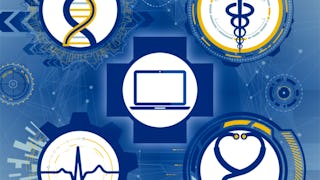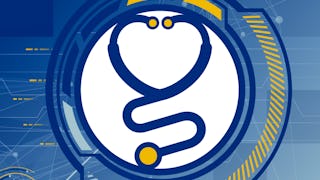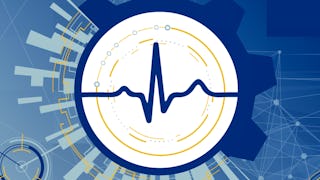Improving health and healthcare institutions requires understanding of data and creation of interventions at the many levels at which health IT interact and affect the institution. These levels range from the external “world” in which the institution operates down to the specific technologies. Data scientists find that, when they aim at implementing their models in practice, it is the “socio” components that are both novel to them and mission critical to success. At the end of this course, students will be able to make a quick assessment of a health informatics problem—or a proposed solution—and to determine what is missing and what more needs to be learned.



The Social and Technical Context of Health Informatics
This course is part of Health Informatics Specialization

Instructor: Harold P. Lehmann, MD, Ph.D.
40,670 already enrolled
Included with 
(527 reviews)
Recommended experience
What you'll learn
Articulate a coherent problem definition of, and a plan for addressing, a healthcare informatics problem.
Create an Informatics Stack analysis of an informatics problem.
Describe eleven socio-technical aspects of a health informatics problem or solution.
Skills you'll gain
- Information Technology
- Technology Strategies
- Medical Imaging
- Interoperability
- Health Care Procedure and Regulation
- Health Informatics
- System Requirements
- Health Information Management
- Health Care
- Health Technology
- Electronic Medical Record
- Emerging Technologies
- Healthcare Industry Knowledge
- Data Literacy
- Health Policy
- Information Privacy
Details to know

Add to your LinkedIn profile
4 assignments
See how employees at top companies are mastering in-demand skills

Build your subject-matter expertise
- Learn new concepts from industry experts
- Gain a foundational understanding of a subject or tool
- Develop job-relevant skills with hands-on projects
- Earn a shareable career certificate

There are 4 modules in this course
In this module, you will be given an introduction to the course and its foundational concepts. After providing examples of health IT in the contexts of patients, providers, and populations—the three contexts we always return to—we articulate the drivers that motivate developments in health IT and informatics. We then provide the core definitions of key terms (like “health IT” and “informatics”) and introduce the core framework for your work in this course, the Informatics Stack.
What's included
11 videos1 reading1 assignment
In this module, we start our journey down the Stack to explain the world of informatics and health IT. We explore the top four levels of the Stack (World, Organization, Roles, and Functions), and then proceed to discuss new US medical-care (“World”) policies that drive health care Organizations to change practice, so they can accomplish their core Functions. We also discuss the history of health IT in relation to such policies in the past. We begin a course-long discussion of interoperability (which occurs at each level of the Stack), and privacy/confidentiality/security. We end with an explication of methods used to Evaluate whether an IT project has achieved the Organizational goals set for that project.
What's included
6 videos1 assignment
In this module, we continue the journey, starting with the role of needs, requirements, and specifications. We then turn to how workflow issues are turned into requirements and how information systems, built to satisfy those requirements, are assembled. We close with the cautionary notes of how poorly built systems harm the very workflows they were designed to improve.
What's included
6 videos1 assignment
This module concludes our journey with discussions of Data, Information, Knowledge, and Technology. Regarding data, we discuss their sources and types and provide examples. We go on to explain differences between information and data, and between knowledge and information. Standards are most important at this level, and we discuss the exchange of text and imaging data. Regarding technology, we use the Hype Cycle as a way for you to keep track of what new technologies are doing what and when. We close with a framework for thinking about careers in health IT and informatics.
What's included
11 videos1 assignment1 peer review
Earn a career certificate
Add this credential to your LinkedIn profile, resume, or CV. Share it on social media and in your performance review.
Instructor

Offered by
Explore more from Health Informatics
 Status: Free Trial
Status: Free Trial
Johns Hopkins University
 Status: Free Trial
Status: Free Trial
Johns Hopkins University


Northeastern University
 Status: Free Trial
Status: Free Trial
Johns Hopkins University
Why people choose Coursera for their career




Learner reviews
527 reviews
- 5 stars
60.37%
- 4 stars
21.88%
- 3 stars
8.49%
- 2 stars
3.01%
- 1 star
6.22%
Showing 3 of 527
Reviewed on Jan 31, 2023
its a very good module,that cover basics of informatics in all specialitits in medical sector
Reviewed on Jun 13, 2020
Content and delivery are very clear and concise, would appreciate some more reading material or reference list for each module but otherwise a wonderful learning resource.
Reviewed on Sep 24, 2023
This was a great foundational course for Healthcare IT and introduction to the Electronic Healthcare System
New to Health Informatics? Start here.

Open new doors with Coursera Plus
Unlimited access to 10,000+ world-class courses, hands-on projects, and job-ready certificate programs - all included in your subscription
Advance your career with an online degree
Earn a degree from world-class universities - 100% online
Join over 3,400 global companies that choose Coursera for Business
Upskill your employees to excel in the digital economy
Frequently asked questions
Access to lectures and assignments depends on your type of enrollment. If you take a course in audit mode, you will be able to see most course materials for free. To access graded assignments and to earn a Certificate, you will need to purchase the Certificate experience, during or after your audit. If you don't see the audit option:
The course may not offer an audit option. You can try a Free Trial instead, or apply for Financial Aid.
The course may offer 'Full Course, No Certificate' instead. This option lets you see all course materials, submit required assessments, and get a final grade. This also means that you will not be able to purchase a Certificate experience.
When you enroll in the course, you get access to all of the courses in the Specialization, and you earn a certificate when you complete the work. Your electronic Certificate will be added to your Accomplishments page - from there, you can print your Certificate or add it to your LinkedIn profile. If you only want to read and view the course content, you can audit the course for free.
If you subscribed, you get a 7-day free trial during which you can cancel at no penalty. After that, we don’t give refunds, but you can cancel your subscription at any time. See our full refund policy.
More questions
Financial aid available,

